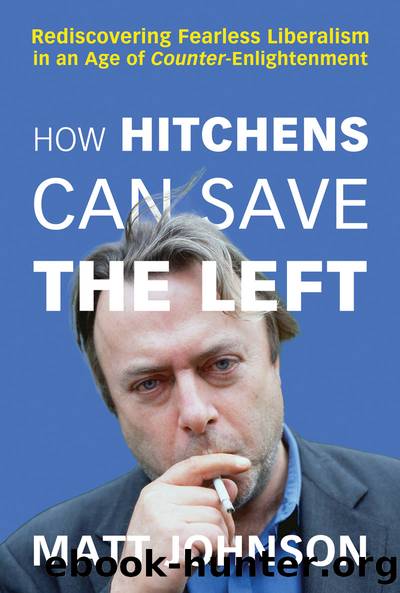How Hitchens Can Save the Left by Matt Johnson

Author:Matt Johnson
Language: eng
Format: epub
Publisher: Pitchstone Publishing
Published: 2023-05-15T00:00:00+00:00
While Hitchens became increasingly suspicious of left-wing utopianism in his later years, he argued that the âworst crimes are still committed in the name of the old traditional rubbish: of loyalty to nation or âorderâ or leadership or tribe or faith.â75 Though this is to some extent a false dichotomy (many of the most brutal utopians throughout history dutifully invoked nation, tribe, and faith), it indicates that Hitchens would have been well-equipped to diagnose and resist a threat like Trumpism. Authoritarian populism is nothing new in Americaâitâs a very traditional piece of rubbish. From the popularity of Father Charles Coughlinâs putrid anti-Semitic and pro-fascist broadcasts in the 1930s to the original America First movement led by Lindbergh to the internment of Japanese Americans during World War II to McCarthyism, the United States has had plenty of powerful demagogues and authoritarian moments.
Hitchens recognized that nationalism and authoritarianism are often symbiotic, a fact thatâs particularly relevant in the context of the liberal democratic worldâs drift toward both over the past decade. After Trumpâs election, a cadre of intellectualsâsuch as the political theorist Yoram Hazony and the editor of National Review, Rich Lowry76âemerged to offer a positive vision of nationalism. In his 2018 book The Virtue of Nationalism, Hazony argues that âuniversal political idealsâof the kind that are so prominent, for example, in the European Unionâseem invariably to generate hatred and bigotry to at least the same degree as nationalist movements.â77 Considering the fact that the unprecedented period of European integration since World War II coincided with a 75-year respite from large-scale interstate warfare on the continentâthe Russian invasion of Ukraine was resisted by a reenergized European Union, an exception which proves the ruleâitâs difficult to see how Hazony arrived at this conclusion.
Despite the best efforts of nationalist intellectuals to present a deodorized version of their movement, the resurrection of nationalism in Europe predictably led to surging authoritarianism and xenophobia. Beyond the devastating consequences of resurgent Russian nationalism, European democracies have faced an extended period of democratic decay driven by the return of nationalist politics across the continent. In Hungary, for instance, Prime Minister Viktor Orbánâs efforts to transform the country into what he affectionately describes as an âilliberal democracyâ have included packing the Constitutional Court and flagrant encroachments on judicial independence; the politicization of regulations for media organizations, NGOs, and educational institutions; and government intrusions on the democratic process through politicized audits, controlled access to the media, and the appropriation of public resources for political purposes.78
In March 2019, Orbánâs party (Fidesz) was suspended from the European Peopleâs Party in the European Parliament, which stated, âWe cannot compromise on democracy, rule of law, freedom of press, academic freedom or minorities rights. And anti-EU rhetoric is unacceptable.â79 Orbán celebrated Britainâs decision to leave the European Union, and Hungaryâs membership in the union is in question over its anti-democratic behavior. Orbán has also made xenophobia a central element of his political platform and rhetoric. In 2018, he told the German newspaper Bild that he regards
Download
This site does not store any files on its server. We only index and link to content provided by other sites. Please contact the content providers to delete copyright contents if any and email us, we'll remove relevant links or contents immediately.
| Anarchism | Communism & Socialism |
| Conservatism & Liberalism | Democracy |
| Fascism | Libertarianism |
| Nationalism | Radicalism |
| Utopian |
The Secret History by Donna Tartt(18058)
The Social Justice Warrior Handbook by Lisa De Pasquale(11930)
Thirteen Reasons Why by Jay Asher(8399)
This Is How You Lose Her by Junot Diaz(6401)
Weapons of Math Destruction by Cathy O'Neil(5779)
Zero to One by Peter Thiel(5444)
Beartown by Fredrik Backman(5293)
The Myth of the Strong Leader by Archie Brown(5204)
The Fire Next Time by James Baldwin(4987)
How Democracies Die by Steven Levitsky & Daniel Ziblatt(4932)
Promise Me, Dad by Joe Biden(4890)
Stone's Rules by Roger Stone(4819)
100 Deadly Skills by Clint Emerson(4647)
Rise and Kill First by Ronen Bergman(4528)
A Higher Loyalty: Truth, Lies, and Leadership by James Comey(4520)
The David Icke Guide to the Global Conspiracy (and how to end it) by David Icke(4348)
Secrecy World by Jake Bernstein(4342)
The Farm by Tom Rob Smith(4294)
The Doomsday Machine by Daniel Ellsberg(4221)
